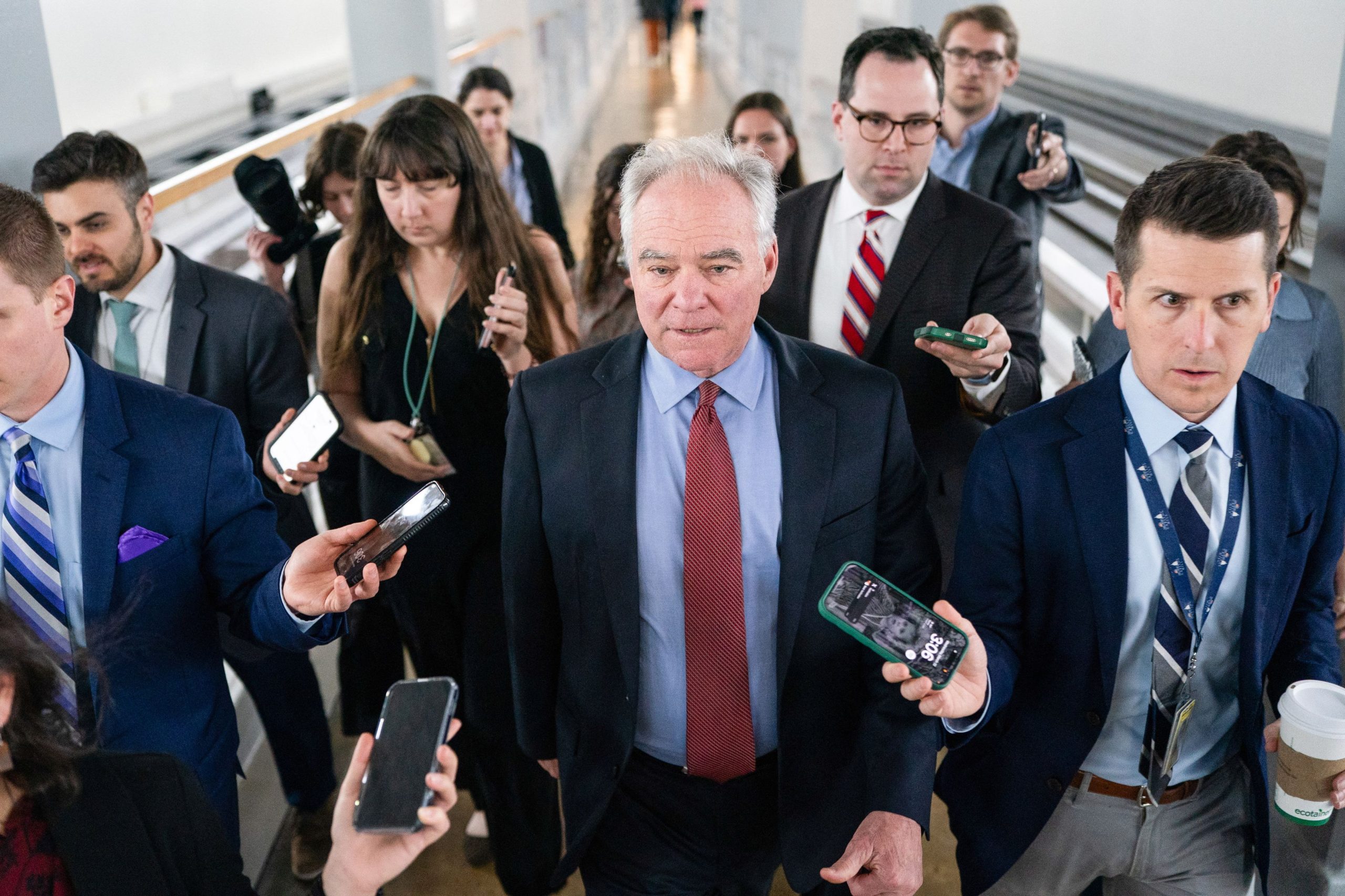WASHINGTON—President Trump’s steadfast support from congressional Republicans faces a fresh challenge Wednesday, when a handful of GOP senators are expected to join Democrats in passing a resolution aiming to undo the president’s 25% tariff on Canadian imports.
The resolution, led by Sen. Tim Kaine (D., Va.), would end an emergency declaration Trump used to impose tariffs on Canadian goods. Under federal law, Congress has the ability to cancel national emergencies declared by the president.
The Senate vote was expected to take place just hours after Trump imposed a 10% baseline tariff on all imports to the U.S., and higher rates for some nations.
The Canada measure will test how many Republicans are willing to say Trump has gone too far in launching a trade war with a close ally—and offer a chance to signal disaffection with his policies more broadly. But the measure is unlikely to become law even if it passes that chamber. The proposal has been blocked in the GOP-led House, and Trump could veto any measure that makes it to his desk.
Senate Majority Leader John Thune (R., S.D.) has worked to stop defections, telling Senate Republicans to stay in line behind the party’s standard-bearer and vote against the resolution. But the unified GOP front is starting to crack as Republicans in some states—particularly those with agricultural interests or ties to Canada—warn about voter backlash.
Republicans have a 53-47 Senate majority, and at least four GOP senators have indicated that they plan to join Democrats in backing the resolution. Other Republican senators, including Sens. Todd Young (R., Ind.) and Jim Justice (R., W. Va.), hadn’t ruled out voting “yes” as of Wednesday afternoon.
Sen. Rand Paul (R., Ky.), an outspoken foe of tariffs, is a co-sponsor of the resolution, which Sens. Susan Collins (R., Maine) and Lisa Murkowski (R., Alaska) also have indicated they intend to support. Sen. Mitch McConnell (R., Ky.), the former Senate majority leader, has also told Kaine that he will vote yes, according to the Democratic senator, providing enough Republican support for the measure to pass.
The vote is an important marker because so far this year Republicans have never mustered the votes to override Trump, even though he has slashed government programs that many Republicans support and muscled through cabinet officials unpopular with Republicans without encountering meaningful resistance.
A 25% import tariff on goods from Mexico and Canada took effect March 4, with an exception for energy products and potash, which received a 10% tariff. The Trump administration later suspended those tariffs until April 2 on autos and all other goods that are eligible for duty-free trade under the U.S.-Mexico-Canada Agreement, or USMCA.
Trump took to his social-media site to attack the four Republicans, saying that they have “been extremely difficult to deal with and, unbelievably disloyal” to Thune and the Republican Party. He said that his measure was an attempt to stop the flow of fentanyl into the U.S., one of the rationales he has repeatedly leaned on in his argument for tariffs on goods from Canada and Mexico. Data from U.S. Customs and Border Protection show that fentanyl predominantly enters the U.S. through the southern border.
“I share the president’s goal of stemming the tide of dangerous fentanyl,” Collins said on the Senate floor. But she said that most fentanyl didn’t come to the U.S. via Canada, and that tariffs would inflict harm on Maine, which she said imports home-heating oil and gasoline from Canada, as well as fertilizer for potato growers. In turn, Maine sends its blueberries and lobsters to Canada for processing.
“The fact is, that if we impose these tariffs on Canadian processing, it’s going to be our Maine lobstermen who will bear the cost. It’s going to be consumers who bear the cost,” Collins said. She said that Canadian tourists have already begun canceling vacation trips to her state.

U.S. Senator Mitch McConnell (R-KY) goes to the chamber as senators grapple with making a deal to fund the U.S. government and avert a shutdown, on Capitol Hill in Washington, D.C., U.S., March 14, 2025. REUTERS/Annabelle Gordon
Kaine said McConnell told him on Tuesday night that he would also vote in favor of the resolution—tipping the scales in favor of passage. “I didn’t get to the question and he said ‘I’m with you,’” Kaine told reporters, describing how he had approached McConnell to discuss the resolution.
The two lawmakers have a mutual interest: Craft brewers in Virginia worry about being subject to reciprocal tariffs, and bourbon makers in Kentucky face the possibility of European Union tariffs of up to 50% in mid-April. During Trump’s first term, the EU had earlier imposed retaliatory tariffs aimed at Kentucky, hurting bourbon makers. A spokesman for McConnell declined to comment.
Sen. Ron Johnson (R., Wis.) opposed the resolution, calling it a Democratic ploy to harm Trump. “I’m not going to participate in trying to damage Trump or poke a stick in his eye,” Johnson said.
The House has taken a step to tie its own hands, inserting language in a procedural measure that prevents it from using the powers it has to cancel the Feb. 1 tariffs. The vote had the effect of blocking a measure introduced by House Democrats to force an up-or-down vote to terminate the emergency declaration that underpins Trump’s tariffs on Canada and Mexico.
There are still pathways for the resolution in the House, albeit unlikely ones. GOP leadership could decide to bring the measure to the floor, or rank-and-file members could try to force a vote on a similar or identical measure using a discharge petition, if they collected 218 signatures.
During Trump’s first term, Congress unsuccessfully tried to override an emergency declaration issued by him in 2019, when both the House and the Senate voted to terminate the national emergency he had declared at the U.S.-Mexico border—a move he had used to transfer money from the military and other sources to construct a wall at the border. Trump vetoed the measure, which lacked the two-thirds support needed to overcome a presidential veto.
At the time , the measure was the first of its kind to pass since lawmakers in 1976 wrote the National Emergencies Act, which allows Congress to terminate an emergency declaration.
Write to Siobhan Hughes at Siobhan.hughes@wsj.com , Gavin Bade at gavin.bade@wsj.com and Lindsay Wise at lindsay.wise@wsj.com



